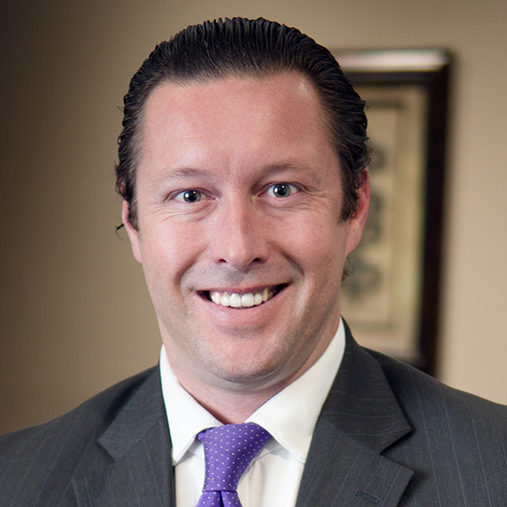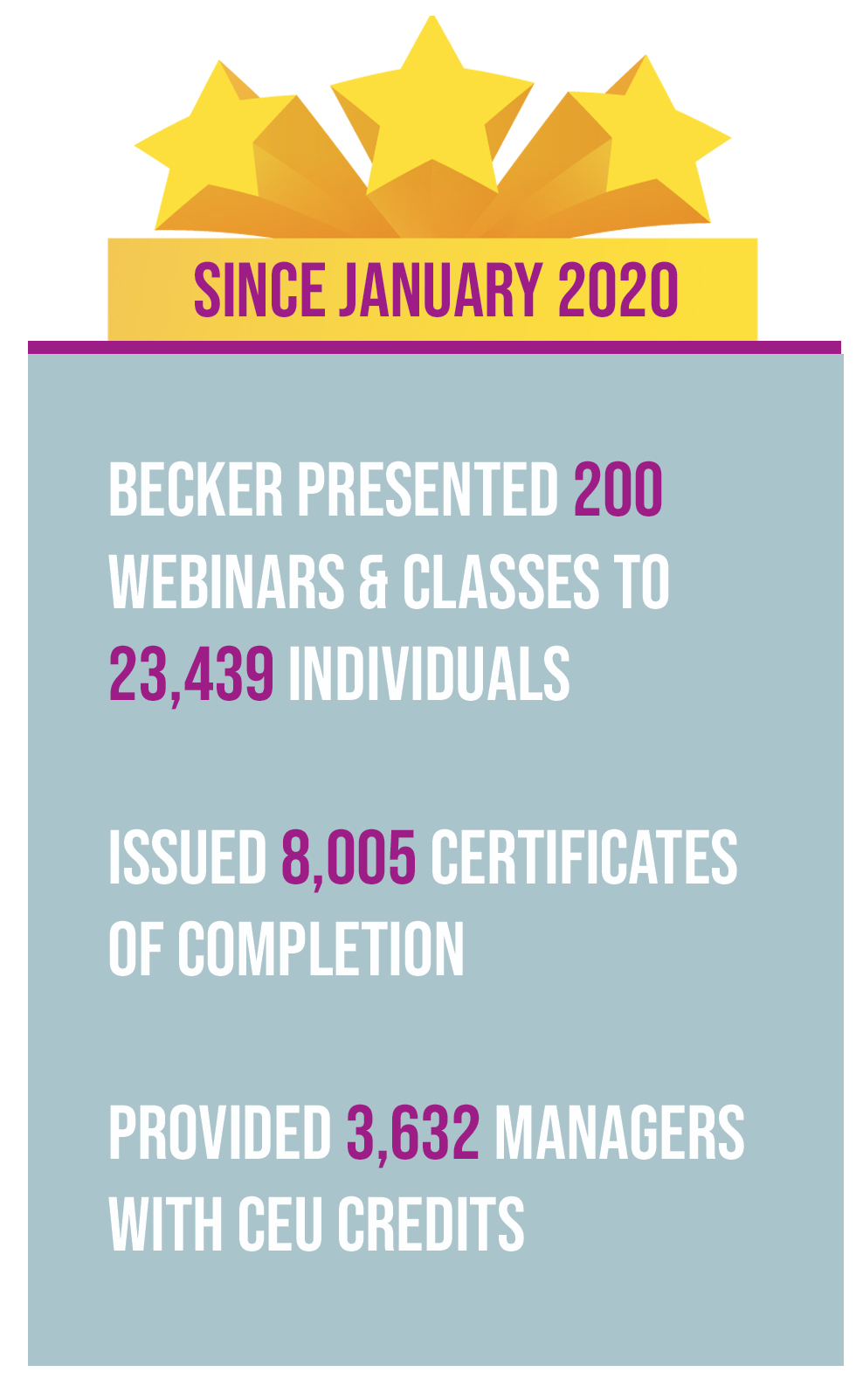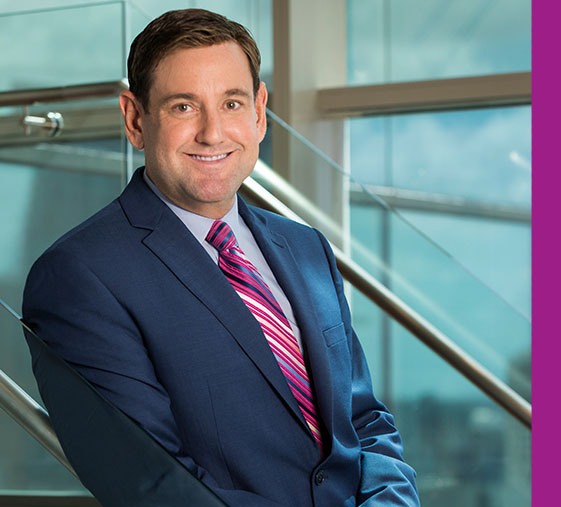In addition to this month’s featured articles, don’t miss all new episodes of our podcast, “Take it to the Board.” In the most recent episode, host Donna DiMaggio Berger is joined by Becker Employment Law Shareholder Jamie Dokovna for an informative discussion on best practices to create and protect a safe work environment. Learn what Jamie thinks is the number one employment mistake community associations make – and how easy it is to avoid it! Also in this issue, Jamie along with Becker Employment Law Shareholder, Ned Bassen, discuss SB 1532, which went into effect October 1, and details new requirements for employers (including community associations) with less than 250 employees.
If your community receives notice about a public hearing to consider or approve a development proposal on adjacent land, does the association or its members have a right to object? Find out in this month’s featured article, “Community Association Due Process Rights with Respect to Neighboring Developments.”
As of July 1, 2021, associations are required to send delinquent owners a Notice of Late Assessments prior to turning the account over to collections. Learn best practices for sending this letter in, “A Guide to Sending the New Notice of Late Assessment.”
Although Florida’s Sunshine Laws don’t apply to community associations, the Condominium Act has its own set of “sunshine” requirements to be aware of. Karyan San Martano breaks down what the statute says in, “‘Sunshine Laws’ for Condominium Associations.”
The ability, and limitations, on transferring limited common elements is at the heart of “THIS CASE (Brown v. Rice).” Learn how this case helped clarify law and what condominiums still need to be mindful of.
EDITORS
Community Association Due Process Rights with Respect to Neighboring Developments
If your community association receives notice about a public hearing to consider or approve a development proposal on adjacent land, does the association or its members have a right to object? Yes, local governments must afford objecting property owners and residents procedural due process, which includes fair notice of the public hearings at which the proposal will be considered and a meaningful opportunity to be heard. However, the extent to which a community association and its residents “have the floor” to object to a proposed development during a public hearing depends on several things.
A Guide to Sending the New Notice of Late Assessment
As of July 1, 2021, associations are required to send delinquent owners a Notice of Late Assessments, giving the owners 30 days to bring the account current prior to turning the account over to the association’s legal counsel for collections. Failure to provide the delinquent owner with this 30-day notice will preclude the association from recovering legal fees related to past due assessments, i.e., any fees incurred in a subsequent collection/foreclosure action. The notice must be sent via first class United States mail to the owner’s last address as reflected in the association’s official records, and if the last address is not the property address, the notice must also be sent to the property address by first class United States mail. The notice is deemed delivered upon mailing and a rebuttable presumption that the notice was mailed as required can be established by a sworn affidavit executed by a board member, officer or agent of the association, or by a licensed manager. A form for the 30-day notice, titled “Notice of Late Assessment” can be found in §§718.121, 719.108 and 720.3085, Fla. Stat.
“Sunshine Laws” for Condominium Associations
Florida’s Sunshine in the Government Act, (“Sunshine Laws”) requires transparency and disclosure in government and business. Although the Sunshine Laws do not apply to condominium associations, the Florida Condominium Act (“Act”) found in Chapter 718, Florida Statutes, contains its own set of “sunshine” requirements for these communities, with transparency being the key to compliance. Issues generally arise in condominiums when there is or appears to be a lack of transparency between the board of directors and the association members.

Brown v. Rice
716 So.2d 807 (Fla. 5th DCA 1998)
By: Jay Roberts
The ability (and limitations) on transferring limited common elements is at the heart of THIS CASE. The declaration of condominium at issue specifically described the garages as limited common elements and gave the developer the authority to assign garages. The subject garage was assigned by the developer to the original purchaser of Unit 511. Unit 511 was at some point conveyed from the original purchaser to Marie Young, who then conveyed the subject garage to another unit / unit owner in the condominium, Maria Brown. Thereafter, Edward and Joan Rice purchased Unit 511 and made claim to the garage, and this lawsuit ensued.
The Court relied upon a then-existing prohibition in the Condominium Act on the conveyance of common elements which are appurtenant to a unit. Prior to and at the time of the Brown decision, §718.106, Florida Statutes (1997), read as follows:
(2) There shall pass with a unit, as appurtenances thereto:
(a) an undivided share in the common elements and common surplus
(b) the exclusive right to use such portion of the common elements as may be provided by the declaration.
In the Court’s view, the garage units were appurtenant to the living units to which they were assigned by the developer. Although chapter 718, Florida Statutes, did not include a definition of “appurtenant,” Black’s Law Dictionary 103 (6th Ed.1990), defines the term as “belonging to; accessory or incident to; adjunct, appended, or annexed to….” Applying this definition, the Court concluded that the developer made the garage units appurtenant to the living units to which they were assigned by referring to the garage units as limited common elements designated for the exclusive use to the individual unit owner. Furthermore, the garage units met the definition of limited common elements provided in Section 718.103(13), Florida Statutes, in that they were common elements reserved for the use of certain unit owners to the exclusion of others. Accordingly, the Court held that the previous transfer of the limited common element garage was ineffective, and the rights to the garage remained with Unit 511.
Following THIS CASE, the Legislature amended §718.106(2), Florida Statutes, several times, and it now reads:
(2) There shall pass with a unit, as appurtenances thereto:
(a) an undivided share in the common elements and common
surplus.
(b) the exclusive right to use such portion of the common elements as may be provided by the declaration, including the right to transfer such right to other units or unit owners to the extent authorized by the declaration as originally recorded, or amendments to the declaration adopted pursuant to the provisions contained therein. Amendments to declarations of condominium providing for the transfer of use rights with respect to the limited common elements are not amendments that materially modify unit appurtenances as described in §718.110(4). However, in order to be effective, the transfer of use rights with respect to limited common elements must be effectuated in conformity with the procedures set forth in the declaration as originally recorded or as amended under the procedures provided therein. This section is intended to clarify existing law and applies to association existing on the effective date of this act (amended portions underlined).
So why does THIS CASE matter? Now the Condominium Act is clear that limited common elements may be transferred between units (limited common element rights can still not be transferred outside of the condominium). HOWEVER, the ability to transfer limited common element use rights amongst units must be contained in the declaration of condominium.
If you are uncertain whether your declaration of condominium has sufficient language to allow for transfer of limited common element use rights amongst unit owners, contact your community association attorney to discuss.
Question of the Month
Q: My condominium is being overrun by commercial vehicles. I am trying to convince my board and fellow owners to change the documents to outlaw them. I got 15 percent of the owners to sign a petition to ban commercial vehicles. I gave the petition to the board but they won’t do anything. Aren’t they required to take some action?
CALLING ALL BOARD MEMBERS AND COMMUNITY MANAGERS
As leaders in Community Association Law, we not only helped write the law – we also teach it.
Did you know Becker provides over 200 educational classes per year throughout the State of Florida on a variety of topics ranging from board member certification to compliance, and everything in between? Our most popular classes are now available online!
To view our entire class roster, visit:
beckerlawyers.com/classes
As a service to the community and industry, we are pleased to offer some of our most popular classes online for you to participate in from the comfort of your own home.
- Insights Into Your Role as a Board Member: Fiduciary Duty & Business Judgement Rule
- 2022 Legal Update
- Anatomy of a Water Leak
- Budgeting & Reserves
- Collection and Foreclosure Strategies for Community Associations
- Construction Contracts and the Lien Law
- Construction Projects Gone Wild
- Dealing with Difficult People
- Disaster Preparedness and Recovery
- HOA/Condo Board Member Certification
- How to Properly Run an Election
- Take a Bite out of Fraudulent Assistance Animal Requests
- Understanding Our Bylaws
Employment Law Change That Community Associations Should Be Aware Of

Senate Bill 1532 amending §409.2576, Florida Statutes went into effect. Previously, only employers with 250 or more employees were required to report newly hired and re-hired individuals to Florida’s State Directory of New Hires within 20 days of hiring. Independent contractors were excluded. Now, as of October 1, any employer, regardless of the number of employees that is a “service recipient” defined as “a person engaged in a trade or business who pays an individual for services rendered in the course of such trade or business” must report all new hires and re-hires to the State’s database. Additionally, employers must report their independent contractors who are paid $600 or more during a calendar year.
The purpose of the statute is to provide information to the Florida Child Support Program to facilitate the collection and disbursement of child support payments and to monitor and enforce child support payments. The statute, however, is silent regarding penalties for failing to report. That said, employers with less than 250 employees should update their onboarding process to include the new reporting requirements and all employers regardless of size should determine whether reporting requirements exist for any independent contractor used by them, update onboarding policies to reflect the changes in the law and provide training for those who perform onboarding and payroll, so they are aware of these changes.
Condominium Associations Should Have Written Collection Policies & Procedures
FLCAJ
The 2021 legislative session brought some significant changes to the Condominium Act, the Cooperative Act, and the Homeowners Association Act. These changes went into effect on July 1, 2021, and many of them impacted the collections and foreclosure process for community associations.
Electric Vehicles, Coming Soon to a Parking Area Near You!
FLCAJ
With the all-electric Ford Mustang Mach-E currently arriving at car dealers, and the Ford F-150 Lightning arriving next spring, as well as Toyota, Nissan, GM, Audi, and so many others car makers already producing all-electric versions of their vehicles, it seems that what used to be considered a niche for adventurous Tesla explorers may become far more commonplace far sooner than many people thought. This is especially the case, given that the advertised MSRP for electric models of many of these vehicles appears to be comparable to their traditional gas-powered counterparts.
While the development in this new technology is exciting for many, it has also led to unexpected issues for some condominiums.
Florida Bar Condominium Law and Policy Life Safety Task Force Report
The Florida Bar Condominium Law and Policy Life Safety Task Force recently undertook an information-gathering and fact-finding mission pertaining to residential building operations in Florida. In October, the Task Force released its 175-page report which includes observations and recommendations on condominium safety.
Below are five of the key takeaways that board members, property managers, and owners should be mindful of. It is unknown at this time which of these recommendations, if any, will be included in a bill during the 2022 Legislative Session. We’ll continue to monitor and keep you apprised over the coming months. If you have any questions regarding the information contained in the report, please contact your Becker attorney.
- Board Authority: The Task Force has recommended that any impediments to a board’s ability to exercise its power and duty to manage and maintain the condominium property, including paying for same, be removed. For example, the report recommends that any limitation on borrowing or special assessment authority, including unit owner voting requirements, be declared retroactively void as against public policy. The same recommendations were made for any limitations on a board’s authority to pursue responsible parties for defective construction.
- Uniform Standards: One of the deficiencies in the current system found to exist by the Task Force was the lack of clear and consistent guidance to boards at the most basic level, including the content and frequency of structural inspections, reserve requirements beyond the statutory “paving, painting, roofing” categories, and the role of local governments and building departments. The Task Force Report includes a series of recommendations to create more bright line guidance for boards in understanding and addressing these issues.
- Reserves: The Task Force Report contains very detailed findings and recommendations regarding reserves. For example, it recommends that reserve studies be made mandatory and combined into a physical inspection report, and that such reports be signed and sealed by a Florida licensed engineer or architect. The report also recommends creating “mandatory” and “optional” reserves. Mandatory reserves would be the expanded list of items that have been required in “developer turnover reports” since 2008, and would include structural maintenance, water-proofing, and life safety systems.
- Liability Of Consultants and Professionals: The Task Force concluded that many of the consultants and professionals who are paid by associations (which are primarily run by volunteer, unpaid board members) seek to limit or disclaim their liability for the quality of the work they do, and in some cases even ask to be indemnified by the association for their own negligence. The Task Force concluded that such limitations and waivers should be declared void as against public policy, as well as any efforts by developers to disclaim warranties for original construction.
- Obsolescence: The Task Force Report notes that nearly two thirds (approximately 900,000 of 1.5 million) condominium units in Florida are 30 years old or older. Depending on a variety of factors (including location, construction methods, and historical maintenance), every building will eventually reach a point where the cost of maintaining it may far outweigh the wisdom of demolishing it, selling the land, and “cashing out”. This process is known as “termination.” The Task Force made specific recommendations to the Governor and the Legislature for termination laws to be closely reviewed and the constant tension between individual property rights and collective economic interest be reexamined.
Undoubtedly, these issues and many others will be the focus of much discussion and debate in the months to come. We will continue to keep you updated periodically.
Can They Do That?
Becker’s “Can They Do That” video series tackles some of the unique problems that homeowners and renters face today. We answer your questions, no matter how far-fetched they may seem. From service animals to nudists in your community, we get to the bottom of it and let you know – “Can They Do That?”
Becker Shareholder Michael Gongora Nominated As Latin Builders Association’s Elected Official of the Year
Becker is proud to announce that Michael Gongora has been nominated as Elected Official of the Year by the Latin Builders Association (LBA). Michael was recently elected for the third time to serve on the Miami Beach Commission (2017–2021). He is the former Chairman of the Miami Beach Latin Chamber of Commerce Board of Directors and the former Chairman of ECOMB – the Environmental Coalition of Miami & the Beaches.
“Whether the task is civic, charitable, business or legal in nature, Michael does the necessary work to reach a positive outcome,” said Perry Adair, Becker’s Miami Office Managing Shareholder. “His service to Miami Dade County and in particular Miami Beach, is admirable. It is gratifying to see his efforts recognized by an organization that is equally committed to the Miami-Dade community.”
Becker Steps Up to the Mic with Podcast,
‘Take It To The Board with Donna DiMaggio Berger’
Becker is thrilled to announce the launch of its community association-focused podcast, Take It To The Board with Donna DiMaggio Berger. For decades, our firm has served the legal needs of this industry through in-person conferences and roundtables, online educational webinars, in-depth blog posts, and easy-to-understand legislative updates; we are delighted to continue the conversation on yet another platform. Join us today!
CURRENT EPISODES:
- Royal Service with James Donnelly
- Fiscal Finesse with Nicole Johnson-Pendergrass
- Nuisance or Necessary: Solving the “Pet” Problem with JoAnn Burnett
- The Technology Tango with Brett Fielo
- Community Immunity with David Ramsey
- Considering the Cost of Counsel with Denise Lash
- Rules & Referencing with Howard Perl
- The Mental Health Challenge with Chris Ayub
- Reserve Funds & Studies with Robert Nordland
- Association Advocacy with Commissioner Mary Molina-Macfie
- The Job of the Journal with Michael Hamline
- HR Hacks with Jamie Dokovna – Part 1
- HR Hacks with Jamie Dokovna – Part 2
DID YOU KNOW?
If you paid special assessments and/or funded reserves in your community association you may be able to offset any taxable gains when you sell your property.
The adjustment to your tax basis depends on a number of factors including whether your property is your primary residence, whether you are a US citizen, whether you are married or single and whether your sales price exceeds the current exemptions. Speak to your CPA about this and keep good records of these expenditures.



















